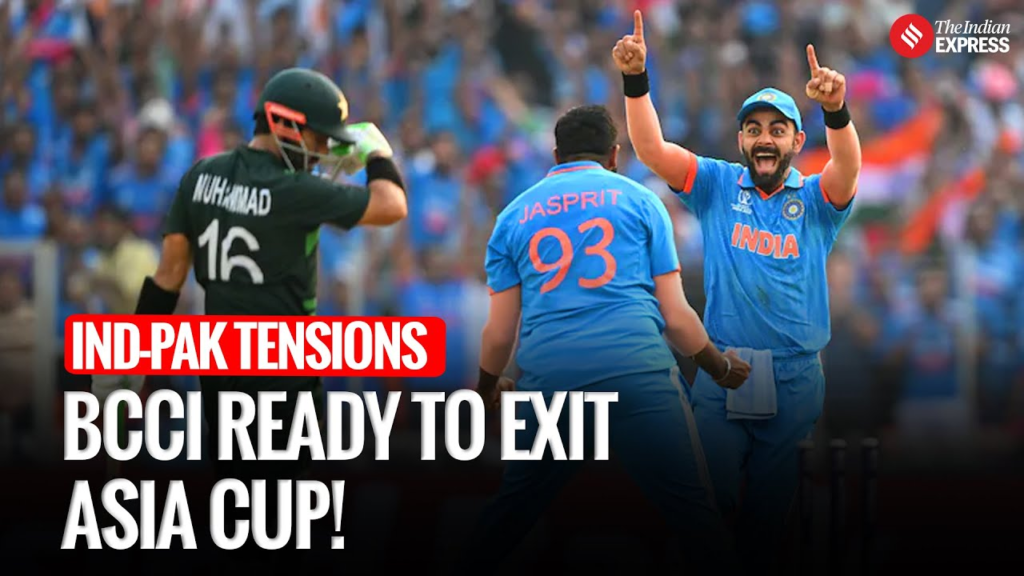In a recent swirl of speculation surrounding India’s participation in the 2025 Asia Cup, the Board of Control for Cricket in India (BCCI) has stepped forward to clarify its stance. Reports suggesting that India was pulling out of the Asian Cricket Council (ACC) events, including the Men’s Asia Cup and the Women’s Emerging Teams Asia Cup, have been firmly dismissed by BCCI Secretary Devajit Saikia. This development comes at a time when cricket diplomacy and India-Pakistan relations are under intense scrutiny, especially following recent geopolitical tensions. The BCCI’s statement aims to set the record straight, but it also raises questions about the future of cricketing ties between the two nations and the role of sports in diplomacy.

Clearing the Air: BCCI’s Official Statement
On May 19, 2025, Devajit Saikia addressed the media to dispel rumors about India’s withdrawal from the ACC-organized tournaments. Speaking to Cricbuzz, Saikia emphasized that no discussions or decisions regarding the Asia Cup or the Women’s Emerging Teams Asia Cup have taken place within the BCCI. He described the circulating reports as “devoid of any truth” and clarified that the board has not communicated any withdrawal to the ACC. “Our prime focus is on the ongoing Indian Premier League (IPL) and the upcoming England series for both the men’s and women’s teams,” Saikia said, redirecting attention to India’s immediate cricketing priorities.
The rumors began after several Indian media outlets reported that the BCCI had decided to boycott the 2025 Asia Cup due to escalating tensions with Pakistan. Some reports even claimed that the BCCI had verbally informed the ACC of its decision to withdraw, citing the leadership of Pakistan’s Interior Minister and Pakistan Cricket Board (PCB) Chairman Mohsin Naqvi as the head of the ACC. These claims suggested that India’s reluctance to participate stemmed from national sentiment and geopolitical concerns, particularly following India’s military operation, Operation Sindoor, in response to a deadly terror attack in Jammu and Kashmir’s Pahalgam.

However, Saikia’s statement has put these speculations to rest, at least for now. He assured that any future decisions regarding ACC events would be officially announced after due deliberation, dismissing the reports as “speculative and imaginary.” This swift response from the BCCI underscores its intent to maintain transparency and focus on cricket amidst a complex political backdrop.
The Context: India-Pakistan Relations and Cricket Diplomacy
Cricket has long been a barometer of India-Pakistan relations, with matches between the two nations drawing millions of viewers worldwide. The sport has often served as a platform for diplomacy, fostering goodwill and dialogue even during tense periods. However, the current geopolitical climate has added layers of complexity to this dynamic. The recent military escalation, including India’s Operation Sindoor targeting terrorist infrastructure in Pakistan and Pakistan-occupied Kashmir, has strained bilateral relations. This tension has spilled over into the cricketing world, raising questions about whether India and Pakistan can continue to compete in regional tournaments like the Asia Cup.
The 2025 Asia Cup, scheduled for September, was set to be hosted by India, with Pakistan’s matches likely to be played at a neutral venue due to India’s longstanding policy of not traveling to Pakistan for security reasons. This hybrid model was successfully implemented in the 2023 Asia Cup, where India played all its matches in Sri Lanka, and in the 2024 ICC Champions Trophy, where India’s games were held in Dubai. These arrangements reflect the delicate balance the ACC and the International Cricket Council (ICC) must strike to ensure both nations can participate without compromising security or diplomatic considerations.

The speculation about India’s withdrawal was fueled by reports citing the BCCI’s discomfort with the ACC’s current leadership under Mohsin Naqvi. As Pakistan’s Interior Minister, Naqvi’s dual role as PCB chairman and ACC president has been a point of contention for some in India, with sources quoted in The Indian Express claiming that “the Indian team can’t play in a tournament organized by the ACC whose chief is a Pakistan minister.” While these sentiments reflect the broader national mood, the BCCI’s official denial suggests that no formal decision has been made to boycott ACC events.
The Stakes: Financial and Emotional Impact
The Asia Cup is more than just a sporting event; it’s a financial powerhouse driven largely by the India-Pakistan rivalry. Matches between the two teams are a major draw for sponsors, broadcasters, and fans, generating significant revenue for the ACC and its member boards. Sony Pictures Networks India, which acquired the media rights for the Asia Cup in 2024 for a reported $170 million over eight years, relies heavily on the viewership of India-Pakistan clashes to justify its investment. Without India’s participation, the tournament’s financial viability could be at risk, potentially leading to its cancellation or a significant reduction in scale.
For fans, the absence of an India-Pakistan match would be a major disappointment. The rivalry is one of the most intense in global sports, with each encounter carrying emotional weight for millions. India, the defending champions of the Asia Cup after their 2023 victory over Sri Lanka, are a dominant force in the tournament, and their potential absence would diminish its competitive and emotional appeal. The five full members of the ACC—India, Pakistan, Bangladesh, Sri Lanka, and Afghanistan—each receive 15% of the broadcasting revenue, making India’s participation crucial for the financial health of the tournament and the smaller boards.
The Bigger Picture: Cricket as a Diplomatic Tool
The BCCI’s denial of withdrawal rumors highlights the delicate role cricket plays in India-Pakistan relations. While the sport has historically been a bridge for dialogue, it is also subject to the ebbs and flows of geopolitical tensions. India’s refusal to engage in bilateral cricket with Pakistan since the 2008 Asia Cup, coupled with its preference for neutral venues in multi-nation tournaments, reflects a cautious approach to cricketing ties. The BCCI’s decisions are often made in consultation with the Indian government, underscoring the intersection of sport and politics.
The ACC, formed in 1983 to promote cricket in the subcontinent, has navigated these challenges before. In 2023, when Pakistan was the official host of the Asia Cup, the BCCI’s refusal to travel led to the adoption of the hybrid model. Similarly, the 2024 Champions Trophy saw India play its matches in Dubai, ensuring the tournament could proceed despite political tensions. These precedents suggest that the ACC and ICC are adept at finding workarounds, but the current situation, with India as the host nation for the 2025 Asia Cup, adds a new layer of complexity.
What Lies Ahead?
As of now, the BCCI’s focus remains on the IPL 2025 season and the upcoming England tours for both the men’s and women’s teams. Saikia’s statement indicates that discussions about the Asia Cup are not on the immediate agenda, but the board has promised to provide updates when decisions are made. The ACC, under Mohsin Naqvi’s leadership, faces the challenge of balancing the interests of its member nations while addressing India’s concerns. A final decision on the tournament’s format and India’s participation is expected at the upcoming ACC meeting, where all stakeholders will have a chance to weigh in.
For now, fans can take heart in the BCCI’s assurance that India remains committed to its cricketing obligations. However, the broader context of India-Pakistan relations suggests that cricket diplomacy will continue to be tested. Whether the 2025 Asia Cup proceeds as planned, adopts a hybrid model, or faces cancellation, the outcome will reflect not just sporting priorities but also the state of relations between two of cricket’s biggest powerhouses.
Conclusion
The BCCI’s swift rebuttal of withdrawal rumors has brought clarity to the speculation surrounding India’s participation in the 2025 Asia Cup. By emphasizing its focus on the IPL and upcoming international commitments, the board has signaled that it is not ready to make hasty decisions about ACC events. Yet, the underlying tensions with Pakistan and the ACC’s leadership highlight the challenges of maintaining cricket as a unifying force in a politically charged environment. As the cricketing world awaits further developments, the 2025 Asia Cup remains a focal point for discussions on sport, diplomacy, and the enduring India-Pakistan rivalry.
Must Read :- Gen Z Is Bringing Back 2000s Fashion Aesthetics Through Instagram Reels






